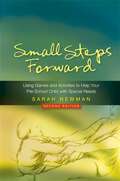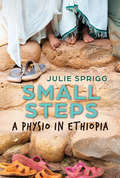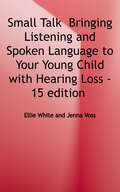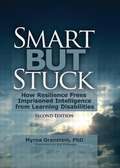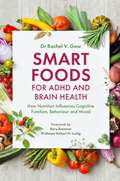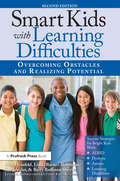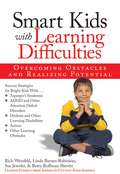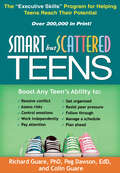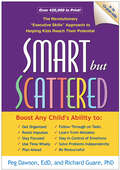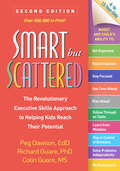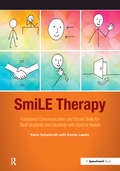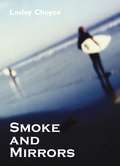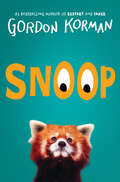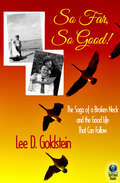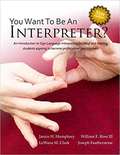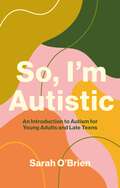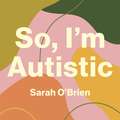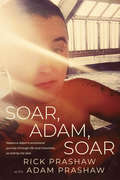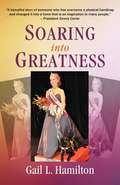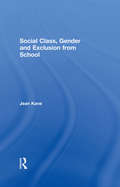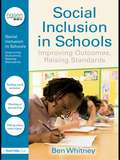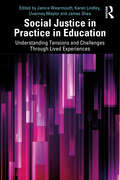- Table View
- List View
Small Steps Forward: Using Games and Activities to Help Your Pre-School Child with Special Needs Second Edition
by Sarah NewmanPraise for the First Edition: 'A warm feeling of positive reassurance and guidance runs throughout the book. [It] offers practical and emotional help, not only to a child's family, but equally to health and educational workers starting out within this field. This book should have a prominent place in every toy and leisure library as well as within childcare agencies.' - Play Matters 'This very useful and readable book provides a wealth of resource ideas to support parents of young children with special needs.' - Downs Syndrome Association (UK) 'This is a very practical book, full of common sense and simple ideas. Although intended for parents this book will also be an invaluable resource for anyone working with children with special needs.' - Let's Play When young children are diagnosed with conditions such as Down Syndrome, autism or other forms of developmental delay, there is much that parents can do to help. This new edition of the award-winning Small Steps Forward includes up-to-date research and practice, providing parents and carers with the information they need and a host of ideas to encourage their child's development. The games and activities use toys and materials which most children will already have, and involve no special preparation. They are also fun to play. Sarah Newman divides skills into six areas - cognitive, linguistic, physical, sensory, social and emotional - for convenient reference. She deals with general issues, such as behaviour management, toilet-training and sleep management, which may be encountered by parents of children with any form of disability - physical, learning or sensory. She also provides an outline of child development so that parents can place their child's progress in context, and gives practical advice on coping with stress of having a child with special needs. This book is an essential guide for parents of young children with developmental disabilities and will also be invaluable to anyone who works with children with special needs.
Small Steps: A Physio in Ethiopia
by Julie SpriggThis heartfelt memoir and travel story is about an idealistic young womanforced to confront the limitations of how much difference she can make in acountry rich in culture but stark in its deprivations. Julie Sprigg spent threeyears in Ethiopia, volunteering at a convent clinic and then teaching the firstphysiotherapy cohort to ever graduate from Gondar University. In Ethiopiashe falls in love, and learns as much about herself as she does about thiscomplex, magnificent country and its people.
Small Talk: Bringing Listening and Spoken Language to Your Young Child with Hearing Loss
by Jenna Voss Ellie WhiteSmall Talk is a resource for families of young children with hearing loss and for professionals guiding families through the early stages of listening and spoken language development. The book contains key information needed to support optimal development presented in an engaging and encouraging way. It's up-to-date, evidence-based and family friendly. Graduate students preparing for careers with children with hearing loss will benefit from the well-organized content and developmentally appropriate focus.
Smart But Stuck: How Resilience Frees Imprisoned Intelligence from Learning Disabilities, Second Edition
by Myrna OrensteinSmart But Stuck, Second Edition, is an updated look at how smart people with learning gaps can not only overcome them, but become successful in learning-and life. The new edition of this classic explores the emotional aspects of learning disabilities and imprisoned intelligence, showing how-and why-smart people with learning disabilities are resilient, and how they help themselves to struggle, survive, and achieve.
Smart Foods for ADHD and Brain Health: How Nutrition Influences Cognitive Function, Behaviour and Mood
by Rachel GowChanging one's diet not only improves physical health, but benefits mood, behaviour and cognitive function at a fundamental level. This book highlights the link between nutrition and mental health and demonstrates the crucial role of diet in supporting individuals with ADHD. Written by an internationally-recognised leader in the growing field of nutritional psychiatry, Dr Rachel Gow takes a nutrition-based look at ADHD and its management. Combining the latest research with the inspirational stories of a range of professionals and individuals whose lives have been touched by the issues raised, this book also includes accessible tips throughout and a chapter of recipes to promote brain health. This is an essential guide to understanding the interplay of brain health and nutrition, and supporting families to build a diet that optimises brain function and health.
Smart Kids With Learning Difficulties: Overcoming Obstacles and Realizing Potential
by Rich Weinfeld Linda Barnes-Robinson Sue Jeweler Betty Roffman ShevitzThe second edition of Smart Kids With Learning Difficulties is an updated and comprehensive must-read for parents, teachers, counselors, and other support professionals of bright kids who face learning challenges every day. This practical book discusses who these students are; how to identify them; what needs to be implemented; best practices, programs, and services; and specific actions to ensure student success. Along with tools and tips, each chapter includes Key Points, a new feature that will help focus and facilitate next steps and desired outcomes and follow-up for parents and teachers. The new edition includes a look at current definitions of twice-exceptional students, updated research findings and identification methods, a detailed description of the laws and policies impacting this population, what works and what doesn't work, model schools, Response to Intervention, Understanding by Design, comprehensive assessments, social-emotional principles, and new assistive technology. Featured in The Fresno Bee
Smart Kids with Learning Difficulties: Overcoming Obstacles and Realizing Potential
by Rich Weinfeld Linda Barnes-Robinson Sue Jeweler Betty Roffman ShevitzSmart Kids With Learning Difficulties: Overcoming Obstacles and Realizing Potential is an engaging must-read for any parent, educator, or counselor of smart kids who face learning difficulties. The authors provide useful, practical advice for helping smart kids with learning challenges succeed in school. Topics covered in the book include: identifying and recognizing gifted/learning disabled students, what the law says about this population, planning and developing accommodations that empower these students, what works and doesn't work in the classroom, tools and checklists to build supportive learning environments, and the roles and responsibilities of parents, students, and school personnel. Book jacket.
Smart Kids with School Problems: Things to Know and Ways to Help
by Priscilla L. VailPriscilla Vail has created an authoritative guide to spot conundrum kids, evaluating their problems, and using the right do and don't strategies for dealing with them in the school environment and at home.
Smart but Scattered Teens: The "Executive Skills" Program for Helping Teens Reach Their Potential
by Peg Dawson Richard Guare Colin Guare"I told you, I'll do it later." "I forgot to turn in the stupid application." "Could you drive me to school? I missed the bus again." "I can't walk the dog--I have too much homework!"If you're the parent of a "smart but scattered" teen, trying to help him or her grow into a self-sufficient, responsible adult may feel like a never-ending battle. Now you have an alternative to micromanaging, cajoling, or ineffective punishments. This positive guide provides a science-based program for promoting teens' independence by building their executive skills--the fundamental brain-based abilities needed to get organized, stay focused, and control impulses and emotions. Executive skills experts Drs. Richard Guare and Peg Dawson are joined by Colin Guare, a young adult who has successfully faced these issues himself. Learn step-by-step strategies to help your teen live up to his or her potential now and in the future--while making your relationship stronger. Helpful worksheets and forms can be downloaded and printed in a convenient 8 1/2" x 11" size. See also the authors' Smart but Scattered (with a focus on 4- to 13-year-olds) and their self-help guide for adults. Plus, Work-Smart Academic Planner: Write It Down, Get It Done, designed for middle and high school students to use in conjunction with coaching, and related titles for professionals. Winner (Third Place)--American Journal of Nursing Book of the Year Award, Consumer Health Category
Smart but Scattered: The Revolutionary "Executive Skills" Approach to Helping Kids Reach Their Potential
by Peg Dawson Richard GuareThere's nothing more frustrating than watching your bright, talented son or daughter struggle with everyday tasks like finishing homework, putting away toys, or following instructions at school. Your "smart but scattered" child might also have trouble coping with disappointment or managing anger. Drs. Peg Dawson and Richard Guare have great news there's a lot you can do to help. The latest research in child development shows that many kids who have the brain and heart to succeed lack or lag behind in crucial "executive skills"--the fundamental habits of mind required for getting organized, staying focused, and controlling impulses and emotions. Learn easy-to-follow steps to identify your child's strengths and weaknesses, use activities and techniques proven to boost specific skills, and problem-solve daily routines. Small changes can add up to big improvements--this empowering book shows how.
Smart but Scattered: The Revolutionary Executive Skills Approach to Helping Kids Reach Their Potential
by Peg Dawson Richard Guare Colin GuareAll kids occasionally space out, get sidetracked, run out of time, or explode in frustration/m-/but some do it much more often than others. If you have a &“smart but scattered&” child, take heart. This encouraging guide is grounded in research on the crucial brain-based skills that 4- to 13-year-olds need to get organized, stay focused, and control their impulses and emotions. The expert authors guide you to identify your child's executive strengths and weaknesses, boost skills that are lacking, fix everyday routines that don't work, and reduce [ital]everyone's[/ital] stress. Including new research, new and updated vignettes, and "A Good Place to Start" suggestions for each skill, the revised and updated second edition features a new chapter on technology and a greatly expanded school chapter. Helpful practical tools can be downloaded and printed. See also the authors' Smart but Scattered Teens, Smart but Scattered--and Stalled (with a focus on emerging adults), and The Smart but Scattered Guide to Success (with a focus on adults).
SmiLE Therapy: Functional Communication and Social Skills for Deaf Students and Students with Special Needs
by Karin Schamroth Emma LawlorStudents with communication difficulties need skills to communicate functionally in everyday situations, without the usual support and protection from home and school. These skills need to be explicitly taught, to enable them to become confident young adults. Smile Therapy is an innovative therapy designed to equip students with the skills necessary to become responsible individuals who operate at the highest level of independence that their circumstances and condition allow. Teachers and speech and language therapists have always included functional life skills practice in their work with students. Now, for the first time, they can do so using a therapy with a proven method that has demonstrable outcomes. This book is a practical step-by-step resource, designed to guide teachers and SLTs in the delivery of Smile Therapy with students who have communication difficulties due to deafness, specific language impairment, learning difficulties, autism or physical disability. Features: a clear step-by-step approach to preparing, running and evaluating Smile Therapy, with photocopiable resources. clear outcome measures from each module to share with parents, staff, education and health managers.
Smoke and Mirrors
by Lesley ChoyceShort-listed for the 2005 CLA Young Adult Canadian Book Award Sixteen-year-old Simon has always been considered odd. Three years ago, a skateboarding accident caused some minor brain damage and made him a little stranger. His career-driven parents mostly leave him alone, and he spends much of his time living in his imagination. When Andrea, whom no one else can see, appears to Simon in class, he is fascinated by her and strikes up a friendship, even though he knows she may be pure hallucination - he’s had imaginary friends before. Andrea says she is there to "help" him, but before the story ends, Simon discovers that it is he who needs to help Andrea, not the other way around.
Snakewalk
by Charles WheelerA hell-raising fisherman who has "a problem with authority," Patrick Todd is blinded in a boating accident and enrolls in a school for blind adults, or "blinks" as he calls them. An extremely sharp fellow, he readily learns to cane and read braille, refusing to let his loss of sight cramp his style. He leads friends from the school, Cole, Bernie and his girlfriend, Geri, on expeditions to San Francisco's bars, forays that don't always end well, but keep Patrick sane. Like Ken Kesey, Wheeler finds a microcosm of modern society in Patrick's new, limited com munity at "blink school." Unlike Kesey's McMurphy, however, Patrick is not at war with any single individual, but struggles instead, and with considerable success, to keep his place in the "regular," or sighted, world. Raunchy, quick-witted and brave, Patrick Todd is a character to remember.
Snoop
by Gordon KormanFrom Gordon Korman, the bestselling author of Restart, the story of a boy who's stuck at home with two broken legs... and who starts using cameras and a drone to spy on his classmates, neighbors, and a possible criminal who's come to town.If Carter hadn't been checking his phone, he might have seen his brother coming down the ski slopes in his direction. And if Carter had seen his brother in time and avoided the crash, he might not have two broken legs right now.Oops.Now Carter is stuck at home for weeks, with both his legs in casts. Bored, he starts checking out the live feeds from police cams around his town. Before he knows it, he's obsessed -- watching his classmates when they don't know he's looking, and discovering some other VERY STRANGE things going on that no one else is noticing.But what happens when Carter is found out... and the people he's watching know where he lives?
So Far, So Good!: The Saga of a Broken Neck, and the Good Life that Can Follow
by Lee D. GoldsteinThe candid and inspiring memoir of one man&’s rewarding life spent in a chair—a story of family, spinal injury, and choosing happiness. Lee Goldstein was fourteen years old when an innocent day at the beach ended in a life-altering accident. Yet even in the midst of that fateful tragedy, Lee finds reasons to be grateful—after all, he was rescued from drowning by a famous singer and hobnobbed with celebrities in the hospital. Lee would spend the rest of his life as a quadriplegic, but thanks to the support of his loving family and his own unflagging determination, he lives a long and beautiful life. Lee and his wife Marilyn raise five adopted children, including Tim, who faces his own challenges when he is diagnosed with autism. Though he later loses Marilyn, Lee goes on to fall in love with and marry Ellen, who makes his later years close to divine. Lee always focuses on the positive, but he pulls no punches in his frank and honest account of what quadriplegics and their caretakers deal with every day, from the use of wheelchairs, to bathroom needs, to the sometimes life-threatening, embarrassing, or hilarious moments of life.
So You Want to be an Interpreter
by William F. Ross Jan Humphrey LeWana Clark Joseph FeatherstoneSo You Want to be an Interpreter is unlike any other entry-level textbook on the market. This new 5th edition has been revised and updated with the latest research and instructional content by the work of a team of authors who have over 150 years of experience interpreting and teaching. They were joined by invited guest authors and members of a Deaf interpreter focus group who have shared insightful contributions as well as feedback from recognized leaders in the profession, past and present. Together their expertise makes this the cutting-edge textbook for Deaf and hearing students studying to become sign language interpreters. The number one student textbook in Interpreter Training Programs and the premier study material for RID and AVLIC written certification exams.
So, I'm Autistic: An Introduction to Autism for Young Adults and Late Teens
by Sarah O'Brien'There isn't a secret manual outlining exactly how to get through your teens and young adulthood as an autistic individual, but this book provides a script for how to do what adulthood will make you do anyway, in a way that is most accessible for you".You've just received an autism diagnosis, so why do you still feel so lost when it comes to what autism actually means for you?Written by autistic advocate Sarah O'Brien, this book gives a much-needed introduction into what autism is and removes the myths, stereotypes and stigma that surround it. Sarah provides insights into what to do after diagnosis and how to approach and navigate the process of informing those in your life, from your family and friends to your teachers or manager at work. Utilising her own experience of feeling lost after diagnosis and navigating all of the 'firsts' of adolescence and young adulthood Sarah provides an honest and friendly voice to guide you through it all.Intelligent and clearly-written, this is the fact-led and information-rich resource that will answer your questions about autism, introduce you to your new community and set you up to thrive as an autistic adult.
So, I'm Autistic: An Introduction to Autism for Young Adults and Late Teens
by Sarah O'Brien'There isn't a secret manual outlining exactly how to get through your teens and young adulthood as an autistic individual, but this book provides a script for how to do what adulthood will make you do anyway, in a way that is most accessible for you".You've just received an autism diagnosis, so why do you still feel so lost when it comes to what autism actually means for you?Written by autistic advocate Sarah O'Brien, this book gives a much-needed introduction into what autism is and removes the myths, stereotypes and stigma that surround it. Sarah provides insights into what to do after diagnosis and how to approach and navigate the process of informing those in your life, from your family and friends to your teachers or manager at work. Utilising her own experience of feeling lost after diagnosis and navigating all of the 'firsts' of adolescence and young adulthood Sarah provides an honest and friendly voice to guide you through it all.Intelligent and clearly-written, this is the fact-led and information-rich resource that will answer your questions about autism, introduce you to your new community and set you up to thrive as an autistic adult.
Soar, Adam, Soar
by Rick Prashaw“Coming out. Coming in. Coming home.” Adam Prashaw’s life was full of surprises from the moment he was born. Assigned female at birth, and with parents who had been expecting a boy, he spent years living as “Rebecca Danielle Adam Prashaw” before coming to terms with being a transgender man. Adam captured hearts with his humour, compassion, and intensity. After a tragic accident cut his life short, he left a legacy of changed lives and a trove of social media posts documenting his life, relationships, transition, and struggles with epilepsy, all with remarkable transparency and directness. In Soar, Adam, Soar, his father, a former priest, retells Adam’s story alongside his son’s own words. From early childhood, through coming out first as a lesbian and then as a man, and his battles with epilepsy and refusal to give in, it chronicles Adam’s drive to define himself, his joyful spirit, and his love of life, which continues to conquer all.
Soaring Into Greatness: A Blind Woman's Vision To Live Her Dreams And Fly
by Gail Hamilton<P>Born ten weeks premature and requiring oxygen to survive, Gail Hamilton's first six weeks of life began within an incubator. <P>Six months later, doctors discovered that Gail had retrolental fibroplasia (RLF), an eye condition caused by the infusion of 100% pure oxygen. By age eleven, she was completely blind. Soaring into Greatness follows Gail's story as her outer visual world merged with her inner vision, forcing her to listen with her inner voice, to follow her heart and tune into her intuition. <P>Subjected to physical and emotional abuse, ostracized and oftentimes feeling alone, Gail's journey is one of the courage and perseverance it takes to find one's way through the darkness and soar. <P> "I believe my desire to fly must be bigger than my fear of falling. Vision is internal, not external, and is guided by my heart, not my eyes. In order to be free, to fly, I must want my dream, feel my dream, and believe that my dream will come true. Most importantly, I must live my dream. I am the creator of my destiny, the composer of my symphony, and I choose to live a life of greatness. " - Gail Hamilton
Social Class and Educational Inequality: The Impact of Parents and Schools
by Iram Siraj Aziza MayoSocial class is often seen as an intractable barrier to success, yet a number of children from disadvantaged backgrounds still manage to show resilience and succeed against the odds. This book presents the findings from fifty Child and Family Case Studies (CFCS) conducted with 13–16 year olds. The authors look specifically at the roles that people and experiences - at home, in schools and in the wider community - have played in the learning life-courses of these children; how these factors have affected their achievement; and explanations and meanings given by respondents to the unique characteristics, experiences and events in their lives. Featuring the voices of real parents and children, and backed up by a decade of quantitative data, this is a compelling record that will help readers to understand the complex nature of social disadvantage and the interplay between risk and protective factors in homes and schools that can make for a transformational educational experience.
Social Class, Gender and Exclusion from School
by Jean KaneRising exclusion rates indicate the continuing marginalisation of many young people in education in the UK. Working-class boys, children living in poverty, and children with additional/special educational needs are among those experiencing a disproportionate rate of exclusion. This book traces the processes of exclusion and alienation from school and relates this to a changing social and economic context. Jean Kane argues that policy on schooling, including curricular reform, needs to be re-connected to the broad political pursuit of social justice, and presents compelling case studies of excluded pupils, showing the multi-faceted identities of pupils, with a particular focus on masculine and feminine identities. This invaluable contribution to the literature offers an alternative analysis where the social identities of pupils are shown to be tied up with their exclusion from school. Themes investigated include: the meanings of school exclusions social class, gender and schooling social identities of excluded pupils negotiating identities in school: moving towards exclusion exclusions and young people’s lives improving participation in schooling. Providing fascinating reading for teachers, social workers, researchers and policy-makers this book considers how educational disadvantage might be addressed through recognition of the gender and class identities of pupils.
Social Inclusion in Schools: Improving Outcomes, Raising Standards (nasen spotlight)
by Ben WhitneyThis book provides the busy teacher with all the information they need to make social inclusion a reality within schools. By demonstrating how teachers and schools must work together to promote the wider welfare of all children, the book focuses particularly on the welfare of children on the margins of society who need the most protection. It shows how teachers can aim to reduce inequalities and maximise the learning opportunities available for these vulnerable children, whatever their background or social class. The author addresses key issues such as: attendance and achievement exclusion and behaviour safeguarding and child protection children at risk of missing education. By emphasizing the Every Child Matters agenda and the importance of joined-up partnership approaches with other professionals and agencies, this book is essential reading for all practitioners working to support pupils at risk of exclusion.
Social Justice in Practice in Education: Understanding Tensions and Challenges Through Lived Experiences
by Janice Wearmouth James Shea Uvanney Maylor Karen LindleyExploring Social Justice in Practice in Education focuses on the tensions and challenges to issues of fairness and social and cognitive justice in the sphere of education. The terms ‘fairness’ and ‘social and cognitive justice’ are often used to justify particular policies and practices in the sphere of education. In providing a clear definition of what they should mean in practice, this book includes a discussion of, and, in some cases, potential resolutions to, tensions and challenges in relation to notions of fairness, and social and cognitive justice that are implicit within individuals’ lived experiences across all phases of education. Through their personal narratives, the authors illustrate how such tensions and challenges have played out in their own lives. They go on to explore differences in interpretations and consequent challenges in putting concepts of social justice into practice. Chapters consider important implications across different sectors and phases of education, including special educational needs, leadership and higher education. This insightful volume will enable educators, at all levels, to hear from students, family members, significant adults/carers and professionals, their experiences of fairness and social justice in education, and about what could be done in the future to redress injustices. It will appeal to readers at all levels in education including those studying for or teaching Education-related degrees at bachelors’, masters’ and doctoral levels.
